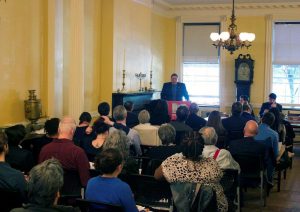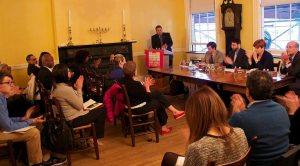The First Annual Lillian Wald Symposium: Can We End Homelessness?
By Henry Street Settlement
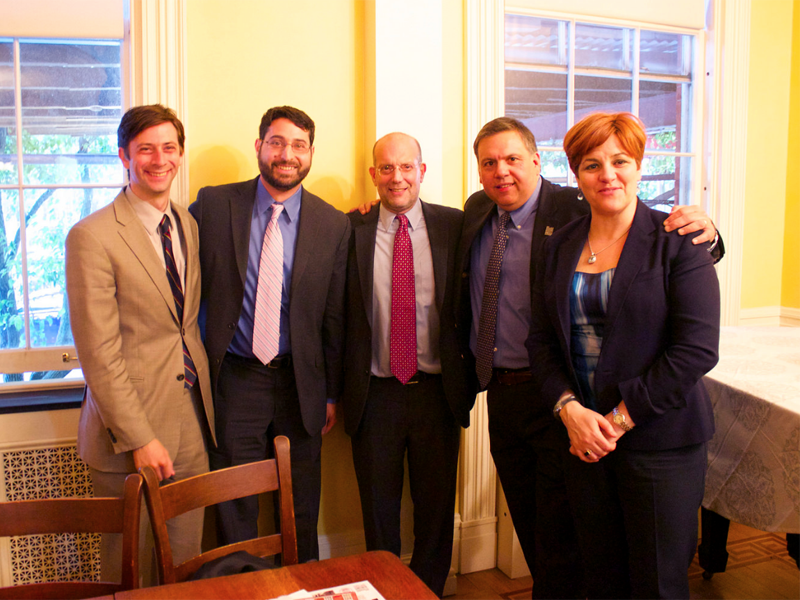
Henry Street’s historic dining room was filled to capacity on May 16, 2016, for the Settlement’s first annual Lillian Wald Symposium entitled “Can We End Homelessness?”
David Garza, Executive Director of Henry Street, welcomed the audience, explaining, “We are here today because of our founder Lillian Wald’s vision and ability to impact lives – a legacy that we carry out every day.
“Wald believed in raising awareness and taking responsibility to address the most pressing social concerns. In her first book, she wrote ‘…it seems that certain conditions were allowed because people did not know…that, if people knew things, such horrors would cease to exist.’
“It’s this commitment to raising awareness and inspiring action that brings us here tonight,” said Garza, “and the horror we want to cease to exist is homelessness.”
Three out of the four panelists – a city commissioner, an elected official, a service provider– said yes, we can end homelessness if certain changes are made; only the historian of poverty didn’t believe it was possible.
Answering this question, and others, were Steven Banks, Commissioner, New York City Department of Social Services; Stephen Levin, New York City Council Member; Christine Quinn, President and CEO of Women in Need; and Ethan Sribnick, Ph.D., co-author of The Poor Among Us: A History of Family Poverty and Homelessness in New York City.
Garza first introduced Theather Huggins, who ended her own homelessness and now works at the same Henry Street shelter she entered as a homeless mother in 1985. As someone who’s been there, Huggins said it’s essential to invest in the families’ education, job skills, mental health and affordable housing needs to prevent a second generation of homeless families. “The families in shelter today are younger, and often the head of household grew up in shelter themselves,” she said.
In response to the symposium question, Levin said, “I recently heard Simon Perez say that he expected to see peace in his lifetime. My takeaway was that you can [accomplish anything], if you will it. We have the means at our fingertips to end homelessness. Education, affordable housing, mental health care and job skills are in our toolbox, but we need policies and it will take a massive commitment.”
“The short answer is no,” said Sribnick. “Modern homelessness is grounded in modern poverty. In the 1850s, homelessness was defined as homeless children (or street children from broken families) and it was solved by institutionalizing them or sending them west on orphan trains to live with farm families. From the 1870s to the 1930s, single men (tramps and vagrants) were the ‘homeless,’ prompting the rise of the municipal lodging house. Since the 1970s, the New Homelessness has emerged, characterized by younger and African American individuals, and more families.” Sribnick said that the shift from an industrial to a service economy, along with the declining value of welfare, family preservation and deinstitutionalization have not changed, and so poverty and homelessness continue to exist. “Targeted policies for the homeless can have an effect, but this is managing the problem, not solving it,” he said.
Calling Sribnick a “Debbie Downer,” Quinn took a more sanguine view. “We have overcome many more challenges,” she said, “We’ve cured polio and landed a man on the moon. We have to believe we can end homelessness, but we can’t do it quickly. If families are moved out too soon, it makes a good press release, but will ultimately fail. There are two parts to homelessness: into the system and out of the system, and the door out is not wide. We need to look at each family to determine what brought them into shelter, and provide services to each individual family member. We need to answer three questions: Why in? Why not out? and Why back? We need to expand aftercare services, and provide separate services for children so they don’t end up back in shelter as adults.”
Banks apologized for being late, explaining that he was at a meeting to get additional resources to end homelessness. “Which we got,” he said, to great applause. “A one-size-fits-all approach will not work; the drivers are many leading to homelessness. Discharges from state prisons, evictions, those with mental health needs are among them. We need all three levels of government to work together.”
Garza asked the panelists what they hoped the situation look like in five years. Levin, ever the optimist, said that we must keep our commitment to programs in place, and we should not be dissuaded but instead expand services. Quinn hoped for more congregate housing and more purpose built shelters with more services, more aftercare and fewer families in shelter. Banks, whose job recently expanded to include the Department of Homeless Services, said he hoped to see a system to provide services in a more seamless fashion. “We need to integrate agencies to provide a continuum of assistance, not have services in silos.”
Audience member Adele Ursone, an artist and Bronxworks board member, asked Levin if there could be more a more rational process for releasing requests for proposals (RFPs), noting that the reimbursements don’t always cover the costs. Banks responded that getting input from nonprofits prior to releasing RFPs is not permitted under city procurement laws.
Nancy Wackstein, former Executive Director of United Neighborhood Houses, said that at a 1986 task force assembled by Mayor Dinkins, Verona Middleton-Jeter, then Executive Director of Henry Street, said ‘that when we have a family in shelter, we have the opportunity to put our arms around them and help give them what they need to move on.’ “That hasn’t happened,” said Wackstein, adding that landlords are reluctant to accept housing vouchers from African American or Hispanic mothers.
Quinn responded that for eight of the last 30 years, Mayor Rudy Giuliani was in office, and so little could be done. And she did agree that racism and sexism do exist among landlords. She reiterated the need for more services to help eliminate homelessness.
Garza concluded the symposium by urging audience members to help end homelessness by volunteering, providing financial support and by getting involved with local community boards.

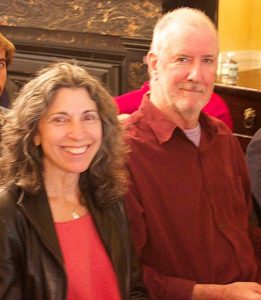
Above: 1) Theather Huggins 2) Adele Ursone and George Matteson
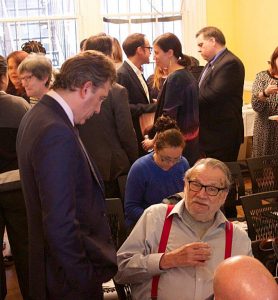
Scott Swid (left, standing) with Danny Kronenfeld (right, sitting)
